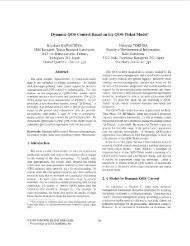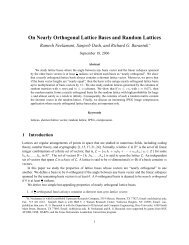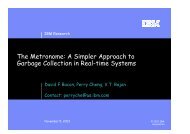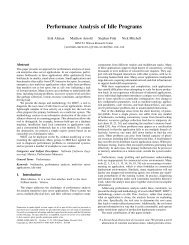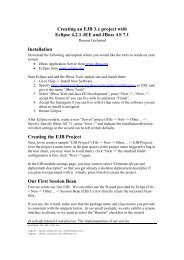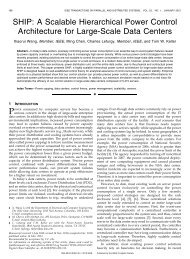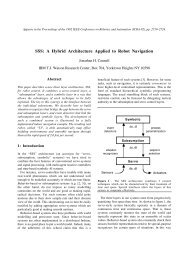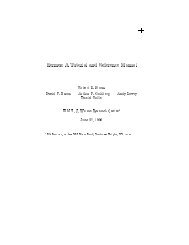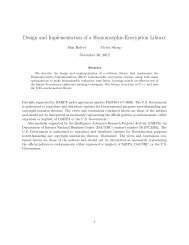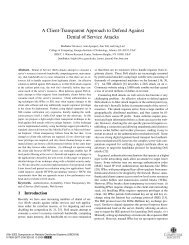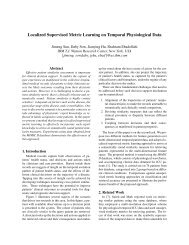Ownership You Can Count On: A Hybrid Approach - Researcher - IBM
Ownership You Can Count On: A Hybrid Approach - Researcher - IBM
Ownership You Can Count On: A Hybrid Approach - Researcher - IBM
Create successful ePaper yourself
Turn your PDF publications into a flip-book with our unique Google optimized e-Paper software.
It is a compile-time error to read from any local variable<br />
which may have lost ownership:<br />
void Fun() {<br />
Foo ^f = new Foo();<br />
Foo ^g = f; // ownership transfers to g<br />
Foo h = f; // error: f has lost ownership<br />
}<br />
The Gel type checker enforces this restriction by performing<br />
control flow analysis on each method and ensuring that no owning<br />
variable loses ownership on any code path leading to a point<br />
where the variable is read. This is a straightforward extension of<br />
the mechanism used to ensure that every variable is initialized<br />
before use.<br />
Gel could, alternatively, cause an owning local variable to<br />
become null if it loses ownership. We've decided against this<br />
behavior since this side effect might not be obviously apparent to<br />
someone reading the code. More fundamentally, this would<br />
destroy the language's erasure property, described in a following<br />
section.<br />
2.1 Fields<br />
As mentioned above, object fields (including both instance<br />
fields and static fields) may have either owning or non-owning<br />
types. Here is a singly linked list class which holds an integer in<br />
each node:<br />
class Node {<br />
public Node ^next;<br />
public int i;<br />
public Node(int j) { i = j; }<br />
}<br />
Gel includes an operator take which takes ownership of a<br />
value from an owning field, and has the side effect of setting the<br />
field's value to null. An expression which reads an owning field<br />
without using take has a non-owning pointer type:<br />
void main() {<br />
Node ^n = new Node(5);<br />
n.next = new Node(4);<br />
Node ^p = n.next; // compile-time error: no<br />
conversion from Node to Node ^<br />
Node ^p = take n.next; // okay: ownership<br />
transfers; now n.next is null<br />
}<br />
Gel could conceivably take ownership from and null out<br />
owning fields automatically whenever they're read in an owning<br />
context; then the take operator would be unnecessary. But then<br />
the side effect of nulling out a field would be much less apparent<br />
to programmers; Gel includes take so that this side effect is<br />
explicit (and to preserve the erasure property described below).<br />
2.2 Methods<br />
A method parameter with owning type takes ownership of the<br />
value passed to that parameter when the method is invoked. If a<br />
method's return type is owning, then the method's caller takes<br />
ownership of the return value when the method returns.<br />
Here is a doubly linked list class with an integer in each node;<br />
its constructor takes arguments with owning and non-owning<br />
pointer types:<br />
class Node {<br />
int i;<br />
public Node ^next;<br />
public Node prev;<br />
public Node(int j, Node ^n, Node p) {<br />
i = j; next = n; prev = p;<br />
}<br />
}<br />
As a larger example, the following method takes an integer k<br />
and returns a doubly linked list containing the integers 1 through<br />
k:<br />
Node ^IntList(int k) {<br />
Node ^n = null;<br />
for (int i = 1 ; i



